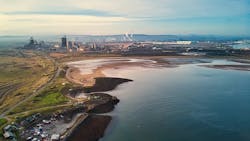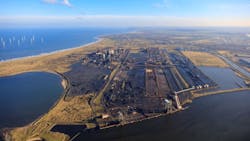NEP partners commit to UK’s first North Sea carbon capture storage development
By Jeremy Beckman, London Editor
bp and partners Equinor and TotalEnergies have taken a final investment decision (FID) on two carbon capture and storage (CCS) projects in Teesside, northeast England.
The Northern Endurance Partnership (NEP) project will transport and store CO2 for the East Coast Cluster CCS cluster. The other project, and part of the same cluster is NZT Power, a gas-fired power plant with carbon capture capabilities to handle emissions generated by industries in northeast England.
EXCLUSIVE CONTENT:
Construction of the NEP facilities should begin in mid-2025, followed by the startup of operations in 2028. The development will include a CO2 gathering network and onshore compression, a new 145-km offshore pipeline, and subsea injection and monitoring facilities for the Endurance saline aquifer located about 1,000 m subsurface in the UK southern North Sea.
The aquifer is 75 km east of Flamborough Head on the North Yorkshire coast, south of Teesside.
Initially, NEP could transport and store up to 4 MMmt/year of captured CO2 emitted from three Teesside projects, rising to an average of up to 23 MMmt by 2035 following expansion of the East Coast Cluster.
The permit allows for first injection by 2027 at a rate of 4 MMmt/year. This, and the Economic Licence issued by the UK’s Department for Energy Security and Net Zero, allows Net Zero North Sea Storage Ltd., a joint venture between the same three companies, to start installing infrastructure on the site.
Endurance, the first UK location to receive a permit was earlier named as one of two locations in the government’s Track 1 cluster. The other, HyNet, will store locally emitted CO2 in the depleted Eni-operated Liverpool Bay fields in the East Irish Sea offshore north Wales/northwest England.
Carbon storage permits
The North Sea Transition Authority (NSTA) expects the government to award a second permit in the next few months. In time, it believes dozens of other storage sites could secure permits each year, with the UK possessing a potential storage capacity of 78 gigatons in natural aquifers and depleted reservoirs.
To satisfy the NSTA that the site was suitable for a permit, the NEP partners had to demonstrate that there would be no significant risk of leakage; the site would be fit for carbon storage; the storage complex as a whole would be suitable (it comprises one containment unit housed within a larger, secondary containment unit); and that the development would present no significant harm to the environment or to human health.
The NZT Power plant will be capable of generating up to 742 MW of decarbonized, flexible power, complementing an increasing volume of intermittent renewable power. It will also have the capacity to capture up to 2 MMmt/year of CO2 for transport and secure storage offshore by the NEP.
bp and Equinor each have a 45% interest in NEP with the remaining 10% owned by TotalEnergies. For NZT Power, bp has a 75% stake and Equinor has 25%.
According to Equinor, nine EPC contractors will share the construction scope under contracts with a combined value of about £4 billion ($5.09 billion).
In addition, NEP has received government approval to progress development engineering for the Humber Carbon Capture Pipeline (HCCP), a proposed onshore infrastructure project farther down the east coast of England that would transport CO2 from future carbon capture projects in the Humber region.
About the Author
Jeremy Beckman
Editor, Europe
Jeremy Beckman has been Editor Europe, Offshore since 1992. Prior to joining Offshore he was a freelance journalist for eight years, working for a variety of electronics, computing and scientific journals in the UK. He regularly writes news columns on trends and events both in the NW Europe offshore region and globally. He also writes features on developments and technology in exploration and production.


